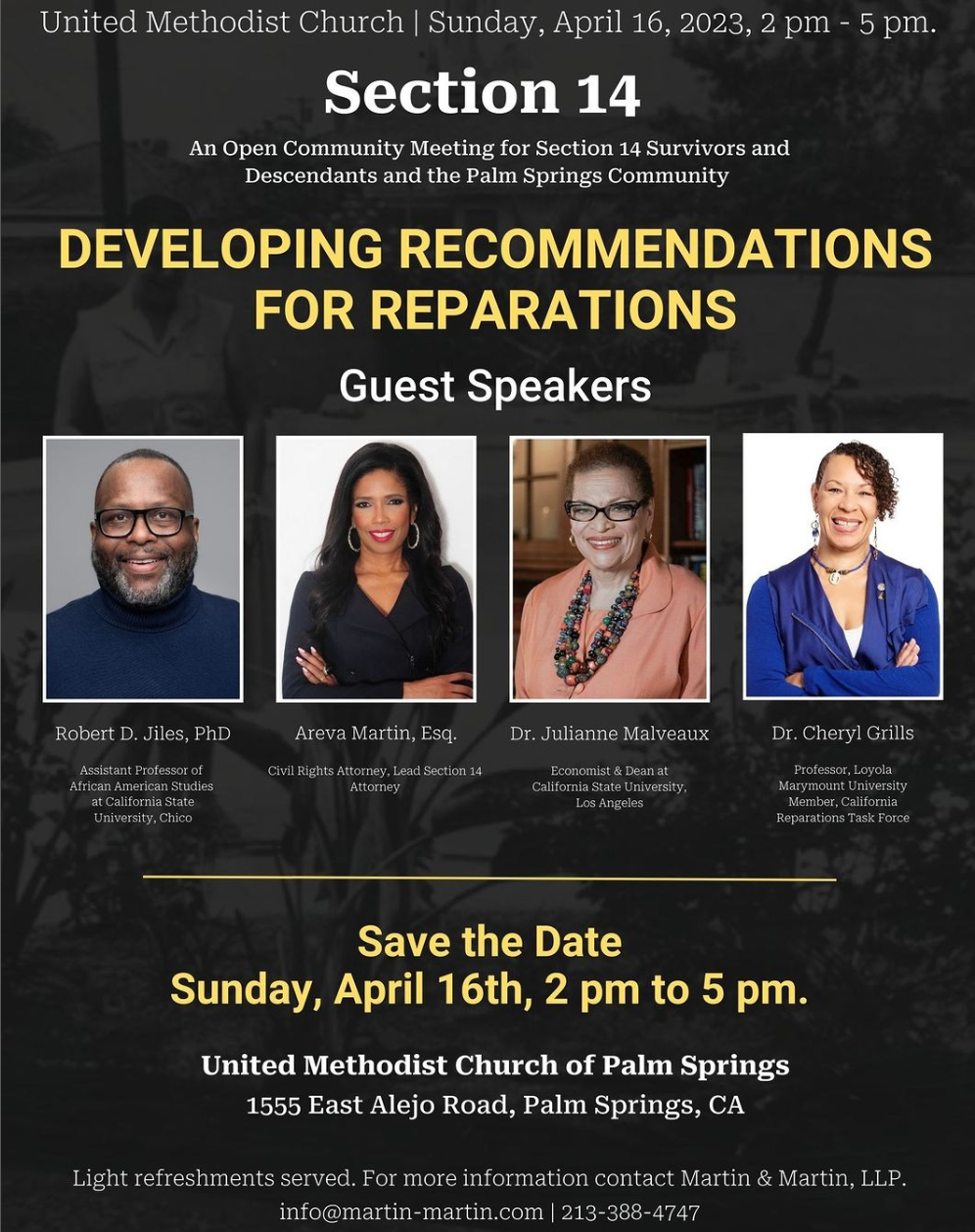Palms Springs Section 14 Survivors and descendants are developing demands for reparations
Four guest speakers educated the community about reparations from an economic and mental health/trauma lens at a local Palm Springs Church.
"My history was from section 14 to the north end, as a child, I am 63 years old of age," says Mickey Brown Freney, a survivor of Section 14. "And still we're fighting for reparations that we clearly deserve. And it shouldn't be no question. It should be no debates anymore."
Section 14 Survivors hosted a conversation about developing recommendations for Reparations with Civil Rights Attorney Areva Martin.
"I wish I could tell you, it's gonna be easy. But that wouldn't be true," says Areva Martin. "This is a major battle because there are people that still want to deny black and brown people, again, the respect the dignity, the justice that they deserve. But I can tell you this, we're not going to give up on this fight. And we don't back down. And we're not going to back down simply because the fight may be difficult or may be challenging, and we may end up in federal court. I don't know I would hope that the city would honor the apology. I would hope that the city would honor the commitment that it made to these families to make them home. They've already made that commitment that's on record. We can go check at the city hall minutes where the city made a commitment to these families I hope they live up to that commitment and we don't have to get to that place but if they don't we're prepared to fight."
One of the speakers said his presentation goal was "to educate the audience on the erasure but also to connect it to the history of Section 14 And how citizens or the people who lived in Section 14 have been described in the media".
News Channel 3 asked how erasure and the history of Section 14 are connected in Dr. Robert D. Jiles's research.
"Erasure, I see it in some documents, news reports in historical documents that talk about the land and also talk about the residents who lived in Section 14 and described them again to people as only domestic workers," says Dr. Robert D. Jiles, a professor of African American Studies at Cal State University Chico. "To use language, that, or nuisances, right, or, you know, people who were in the way of making progress in Palm Springs at the time to describe the land is slums, as the slum to describe the land as a health hazard. And it's about only describing the land, is that right? Not describing section 14 as a community as it was. So using derogatory language strips the history of the community away, and just describes it as a place that was an undesirable place in Palm Springs. But that's not what it was, it was home to many people who were, in fact, you know, they worked in Palm Springs, they were made, they were cooks, they were landscapers, they were contractors, they were construction workers, they were people who contributed to the success of this city. And there, the history of that has been erased mostly by the type of language that has been used to describe the conditions in Section 14. And the people, right, and that describe the people as human beings who have families who attended church on section 14 land to devalue that part of their humanity and reduce it, reduce them to, to obstacles to creating, you know, commercial development on that lands."
Locals who had no connection to Section 14 came to listen to the information and they asked why the city council was not in attendance. "we haven't lost anything," says Martin. "So there'll be ample opportunities for us to have joint meetings with the city council. But once we define what reparations should be for this community, for too long this, this community of survivors and descendants hasn't had a voice. So we don't need the city council here to tell us what to do. We're perfectly capable of developing a reparations plan with the consultants that we've brought into this case, with the expertise I have as a civil rights lawyer. So we'll get to the city council, there's no issue."
"I'm appalled that how we once again are still being harassed, and discriminated against," say Brow Freney. "We want reparation, not segregation."
Sunday, April 16, 2023, from 2:00 - 5:00 pm at United Methodist Church Palm Springs.
In previous reports, we heard from locals that lived in Section 14 during the late 60s when they were evicted from the land and asked to move.
Those individuals now have a Civil rights attorney that is providing experts to discuss reparation proposals like the San Francisco proposal for reparations and the effects surrounding the history of the land they once lived on.
The conversation is open to everyone.

